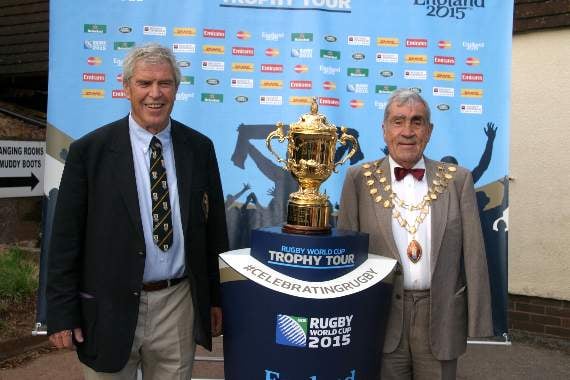THE name William Webb Ellis has become synonymous with the game of Rugby Football, indeed his is undoubtedly the most famous name associated with the sport.
However, how much is fact and how much is fiction? Is he a legend or simply a myth?
Many articles have been written about Webb Ellis over the years but there is very little evidence to suggest that he had much, if anything to do with the origins of the modern game.
The debate surrounding Webb Ellis’s part in the origins of the game has continued for years and it is somewhat surprising that the world of rugby has put him on such a pedestal when in fact there is virtually no evidence to justify it.
The “Ultimate Encyclopedia of Rugby” made the point: “there are so many conflicting reports as to how the game of rugby came into being that the only thing that is for certain is that Rugby School’s William Webb Ellis did not spontaneously invent the game when he picked up the ball and ran with it, showing a fine disregard for the rules of football as played in his time”.
It went on: “The time in question was 1823 and at that time all codes of football involved running and handling”.
According to Malcolm Lee, the Master in Charge of Rugby School football in 1978 whilst in conversation with John Reason and Carwyn James in “The World of Rugby”, the football game played at Rugby School had very little in the way of rules and those that did exist were made up by the boys each time that they went out to play the game and were frequently changed.
WHAT IS KNOWN OF WEBB ELLIS?
So what is known about Webb Ellis?
He was born in 1806 in Salford, Lancashire to parents James Ellis of the Dragoon Guards and Ann Webb who had married two years earlier in Exeter.
James was killed in the cavalry battle of Albuera in 1812. Ann decided to move to Warwickshire with the aim of providing her children with a good education at no cost.
William was accepted at Rugby School as a Foundation boy and began his education there in 1816.
He turned out to be a good scholar and very good cricketer. On leaving Rugby School in 1826, he went to Brasenose College, Oxford, aged 20.
He played cricket for his college, and for Oxford University against Cambridge University in a first-class match in 1827.
He graduated with a B.A. in 1829 and received his M.A. in 1831.
He entered the Church and became chaplain of St George’s Chapel, Albemarle Street, London and then rector of St. Clement Danes in the Strand. In 1855, he became rector of Magdalen Laver in Essex.
STARTED AT RUGBY SCHOOL
The alleged incident occurred in 1823 although apparently there is nothing written at Rugby School that actually recorded the incident.
It would seem his deed went more or less unnoticed at the time or if it was noticed then no particular significance was attached to it. The fact of the matter is that nothing was ever mentioned about the incident.
The game played at the school at the time involved kicking and running and with ball in-hand, the main difference being that a player who caught the ball could retreat as far as he wished with the ball in-hand whilst the opposition could only advance as far as the point where the ball had been caught.
The ball was then either punted or placed on the ground for another player to kick although once the ball touched the ground, then the opposition could continue their rush forward.
What Webb Ellis is alleged to have done was to catch the ball and run towards the opponents. What happened after that or how it affected the result is not known. So where has all the WWE theory stemmed from?
FOUR YEARS
Fast forward to 1876, some 53 years after the alleged incident and four years after the death of William Webb Ellis and enter Matthew Bloxham, a former pupil at Rugby School from 1813 to 1820 and so for four years was at the school at the same time as Webb Ellis, although he left three years before the event.
He qualified as a solicitor although was not overly successful and always maintained close links with Rugby School and especially with the game of rugby.
In 1876 an article appeared in “The Standard Newspaper” about the origins of the game, Bloxham wrote to the Rugby School Magazine, “The Meteor”, with a description of the game as played when he was at the school.
He followed this up with another letter in October 1876 which provided the first mention of William Webb Ellis and his exploits and which he claimed was told to him by another unidentified person.
22 YEARS LATER
From the WWE incident in 1823 it took a further 22 years for any rules to be drawn up in 1845 when the first written rules were adopted by Rugby School.
From then on until the formation of the Rugby Football Union in 1871, various amended rules were drawn up but in all that time no mention of William Webb Ellis.
In 1895, The Old Rugbeian Society decided to conduct an investigation, this at a time when the game of rugby was in crisis with the fallout around professionalism and the breakaway by the Northern Union to form their own professional league.
Unfortunately, Bloxham died in 1888 and as a consequence could not be a part of the investigation.
So Matthew Bloxham himself was the originator of the William Webb Ellis story, having been told it by an unknown third party some 53 years after the event and four years after the death of William Webb Ellis and with no substantive evidence.
Webb Ellis never married and died in the South of France in 1872, leaving an estate of £9,000, mostly to various charities.
His grave in "le cimetière du vieux château" at Menton in Alpes Maritimes, just a few miles along the coast from Monaco, was rediscovered by Ross McWhirter in 1958.
Despite being completely overgrown, it was renovated by the Riviera Hash House Harriers in 2003 and is now maintained by the French Rugby Federation.
The human has always been a competitive animal (why are we called the human race!!) and as we have evolved so has sport.
Many sports can be traced back hundreds of years to an activity that bears some resemblance to a modern game.
For example Athletics can be traced back to 770 BC the Olympic Games, the word athlete is Greek for “combatant in public games”.
IMMORTALISED
In fact most popular sports can trace back more than 2,000 years to some sort of activity of a similar nature, the Chinese, Greeks and Romans all played sport of some sort.
However, we all look to find some moment in history where we might be able to say, yes this is where it all began and so it is with rugby through William Webb Ellis.
Immortalised in Rugby folklore with the biggest competition in the game of rugby named after him and who went to his grave totally oblivious as to what his name would eventually mean.
Like so many who went before and since, he only gained fame after death.
So what is he? Legend or myth, who is to say? Or is he simply a reminder of a romantic notion that…well it had to start somewhere?
Paul Harris
Crediton RFC





Comments
This article has no comments yet. Be the first to leave a comment.